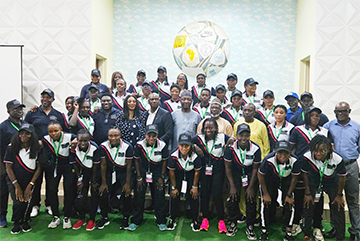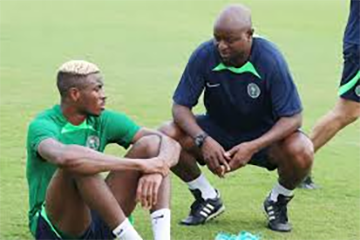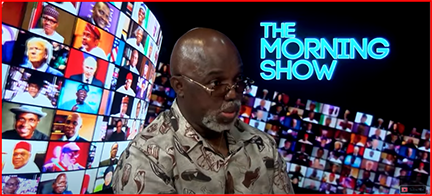Nigerian Football
Nigeria Football Federation Clocks 84, But They Don’t Know
BY KUNLE SOLAJA.
The Nigeria Football Federation (NFF) is 84 this Monday, even though officially, the body thinks it is 72 on an unknown date this year as reflected in its emblem.
As it is this year, the anniversary of Nigeria’s football governing body has always passed unnoticed, owing to improper record keeping which has made its officials to erroneously take the body’s foundation to be an undisclosed day in 1945.
“Founded 1945” now adorns the badge of the NFF. But no fact exists to back up the 1945 dateless claim, except the general belief that the Governor’s Cup which changed to Challenge Cup, later the Coca-Cola FA Cup and the Federation Cup and now AITEO was instituted that year by the then NFA.
Efforts to enunciate the facts on what was previously known as the Nigeria Football Association (NFA) to the successive boards since 2003 had always been rebuffed. Verifiable archival materials have revealed that the NFF was founded at 7pm on Monday August 21, 1933, at house number 42, Broad Street, Lagos. The building still exists.
All the facts on the actual foundation date are verifiable and still exist. The facts were passed to the penultimate former Minister of Sports, Mallam Bolaji Abdullahi and the immediate former NFF president, Alhaji Aminu Maigari as well as his successor.
All are possibly still studying the documents presented to them. The documents had earlier been presented to the last two regimes of the then NFA/NFF – Ibrahim Galadima and Sani Ahmed Lulu as well as a former minister of Sports, Abdulrahman Hassan Gimba in 2008.
A presentation of the documents was made to the Alhaji Ibrahim Galadima-led NFA board on April 9, 2003. This was followed by a similar presentation to Alhaji Sani Lulu board on March 6, 2007, at the Lagos liaison office of the NFF.
There is no official reaction as all just promised to look into the documents. Alhaji Aminu Maigari was more receptive to dig a little bit into the documented evidences provided, but he was overwhelmed by the crisis that trailed the tail end of his tenure.
The current NFF president, Amaju Pinnick also has the documents since June 7, but no official reaction at the moment.
Most of the evidences on the actual foundation date of the Nigerian football governing body can be found at the Department of National Archives at the University of Ibadan.
The August 21, 1933 edition of the Nigerian Daily Times, which later changed to Daily Times, carried the advertisement of the meeting of football enthusiasts who planned to form a central organisation to be named Nigeria Football Association.
It called on interested people to attend. The venue was the Health Office, 42 Broad Street, Lagos. The building still exists as the Lagos Island Local Government Primary Health Clinic.
Four days later, the foundation of the NFA was reported in the Nigerian Daily Times of Friday, August 25, 1933, under the headline: “Nigeria Football Association.”
It was reported that 30 delegates attended the foundation of the NFA. One Henry A. Porter was appointed the first ever NFA boss.
He went by the title: ‘President.’ Porter was also the founding chairman of the LDAFA (now Lagos FA) in 1932, and secretary of the Public Works Department (PWD) club.
Other pioneer officials of the then NFA included three vice presidents –Adeyemo Alakija, Dr. Isaac Ladipo Oluwole and Baron Frederick Mulford (a white expatriate fondly called Baba Eko).
Joseph Mead was the pioneer secretary. According to the newspaper report, the NFA had 10 affiliated clubs at its foundation. They were Abeokuta and nine Lagos teams that accepted to become parent clubs. The nine founding parent clubs were Afric, Olympics, Health, PWD, Muslims, Railway Institute, Marine, Spalding and UAC.
The only definite refusal among Lagos- based clubs to become a parent club was the Police club which argued that a national association was an approach towards professionalism.
At that time, even up to the 1950s, professional football was scornfully regarded. For instance, in an article in the Sunday Times of September, 20 1953, NFA Secretary, R.B. Allen, never hid his hatred for professional football as it was regarded as capable of corrupting players.
The maiden annual general meeting of the NFA was fixed for January 1934. But it did not hold until Monday, February19, 1934. The half page uptight positioned report of the first annual general meeting of body was published in the Nigerian Daily Times edition of February 22, 1934, which is also available at the Department of National Archives at the University of Ibadan.
The secretary, Mead, complained that the response to invitations issued to clubs and districts to become members was poor.
He read a report dealing with efforts to popularise the idea of a national association. Mead stated that principal centres had been contracted on the aims and objectives of the NFA. But it seemed it was not a popular idea.
The newspaper account of the first Annual General Meeting of the then NFA revealed that the only definite acceptance of invitation to become district associations was from Abeokuta, Lagos Amateur and Lagos European Amateur Associations while Ijebu Ode promised to inaugurate a district association and league in the following season.
But more significantly, Mead reportedly told the meeting that an application had been forwarded to The Football Association (The FA) in London for affiliation.
That led to another opening in the search for the true origin of what is now known as the NFF. A letter was dispatched to The Football Association in England by this reporter.
David Berber, the Public Affairs Officer at The FA in a response dated April 2, 1996, wrote in part: “I can advise that the name of the Nigeria Football Association first appeared in the FA Handbook for the season 1938-39 in the list of our affiliated associations. The NFA secretary at that time was F.B Mulford, with a Lagos address.”
That is an indication that the body had existed before 1945. Then a visit to the offices of the oldest football body in the world which will, on October 26, celebrate its 154th anniversary resulted in more startling revelations.
Nigerian Football
Nigerian women coaches conclude first module of CAF C-License course

A total of 30 women coaches have concluded the first of a three-module CAF C-License program in the Federal Capital, Abuja and are expected to commence a two-week internship with different teams in a few days.
Peopled largely by former Nigerian internationals and other serving coaches, the group was taken through a full week of rigorous classroom and practical sessions by a team of coach educators and resource persons, in a baptism of what the next two modules are likely to entail,
NFF Technical Director, Coach Augustine Eguavoen, told thenff.com that the first module has shown that the women coaches are actually desirous of learning.
“I am very much impressed with their attitude, mannerisms and conduct through the first module. They impressed everyone, and the coach educators also told me they were impressed, and are looking forward to having them back for the second and concluding modules.
“We are grateful for the leadership of the NFF for the support and encouragement for coach-education programmes all the time.”
The participants will return to Abuja for the second module that is scheduled for 12th – 20th August, after which they will go on another two-week internship, 23rd August – 4th September. The third module, which comes with examinations for the participants, will take place 9th – 19th September.
Dr. Terry Babatunde Eguaoje, NFF’s Head of Education, is among the coach educators’ team, which also includes Coaches Isah Ladan Bosso, Wemimo Olanrewaju and Lanrence Ndaks.
Among the 30 participants are former Super Falcons’ stars Precious Dede, Joy Jegede, Esther Michael, Maureen Eke, Otas Ogbonmwan, Vera Okolo, Cecilia Nku, Taiwo Ajobiewe, Gloria Ofoegbu and Amenze Aighewi. There are also Barr. Victoria Nlemigbo and retired FIFA referee Folusho Ajayi.
Nigerian Football
Osimhen’s outburst was a moment of madness, says Amaju

Former Nigeria Football Federation (NFF) President and a FIFA Council member, Amaju Pinnick has expressed shock at last month’s outburst by Super Eagles’ striker, Victor Osimhen against Finidi George.
“It is very unfortunate”, Amaju Pinnick remarked on an Arise Television programme. The former NFF president said he had put a call to Osimhen who was very remorseful while the telephone conversation lasted.
“I told him he has to apologise, and I am sure he will if he has not yet done so.” Amaju remarked that he could not comprehend what went wrong as Osimhen was the most cool-headed player in the national team.
He went on to remark that Finidi George was not a personality to be disregarded like that. He has won virtually every honour available during his playing days and was a member of the Super Eagles at their peak when Nigeria ranked fifth in the world.
“I believe players should learn to respect their coaches”, said the former NFF boss.
Nigerian Football
I prefer a foreign coach for the Super Eagles, says Amaju

Nigeria’s FIFA Council member, Amaju Pinnick has told the world that he has always been an advocate of foreign coaches for the Super Eagles. He spoke on Arise Television while fielding questions with Reuben Abati, Rufai Oseni and Ayo Mairo-Ese.
His reason for being averse to indigenous coaches stemmed from lack of respect for them by the players.
“Yes, the Nigerian coaches have the requisite knowledge and the technical ability, but modern football is beyond that in managing players.
“Will the national team players respect the coach? The sad thing is that they don’t”, said Amaju Pinnick.
He however revealed that he supported the appointment of Finidi George owing to the circumstances that the NFF found itself after the exit of Jose Peseiro.
The NFF, he revealed, had no money to hire a foreign coach. The body therefore went for the most available option, Finidi to ensure a smooth transition.
“Finidi was part of the coaching crew of Peseiro and it was therefore logical to ask him to continue.
-

 Nigerian Football1 week ago
Nigerian Football1 week agoI prefer a foreign coach for the Super Eagles, says Amaju
-

 Olympics5 days ago
Olympics5 days agoBrazilian women train in Zidane’s birthplace ahead of Nigeria Super Falcons clash
-

 Premier League1 week ago
Premier League1 week agoNigerian-born Man United’s new striker promises creativity and unpredictability to fans
-

 Nigerian Football1 week ago
Nigerian Football1 week agoOsimhen’s outburst was a moment of madness, says Amaju
-

 Olympics10 hours ago
Olympics10 hours agoThis is my story: Odegbami on how he is stranded in London
-

 Olympics6 days ago
Olympics6 days agoTeams plan for lack of toilets on Paris opening ceremony barges
-

 OBITUARY1 day ago
OBITUARY1 day agoBREAKING! Former Heartland FC owner, Iwuanyanwu, dies at 81
-

 Olympics4 days ago
Olympics4 days agoSuper Falcons’ opponent, Brazil’s Marta and 3 Africans listed among 10 footballers to watch at Paris 2024


